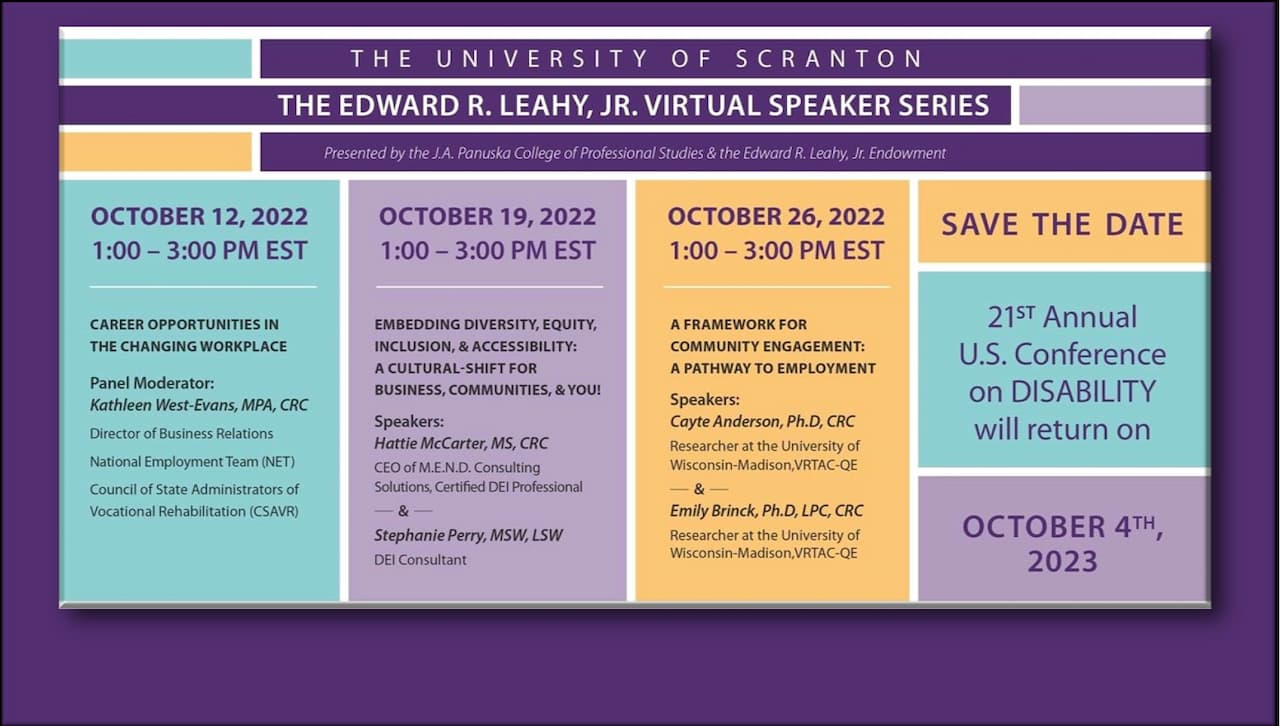Annual U.S. Conference on Disability Goes Virtual

The Edward R. Leahy, Jr. Virtual Speaker Series, presented by the JA Panuska College of Professional Studies and the Edward R. Leahy Jr. Endowment, offers a virtual conference with new topics and a new format. Registration is required for each program.
Oct. 12, 2022
1 - 3 p.m. EST
"Career Opportunities in the Changing Workplace"
Panel Moderator: Kathy West Evans, MPA, CRC Director of Business Relations, National Employment Team (NET), Council of State Administrators of Vocational Rehabilitation ( CSAVR).
Join a panel of business partners to learn about their companies and trends that are shaping the future workplace in the U.S. Participants will learn more about the NET, as well as key business partners representing the private and public sector – UnitedHealth Group, Dell and the U.S. Department of Transportation. Discussions will include the ways these companies are responding to workplace changes. Also, they will offer insight on working with the VR-NET to ensure that their talent pipeline includes candidates with disabilities, as well as supporting employees with disabilities throughout their employment life cycle.
October 19, 2022
1- 3:00 p.m. EST
"Embedding Diversity, Equity, Inclusion, and Accessibility: A Cultural Shift for Business Communities, and You!"
Speakers: Hattie McCarter, MS, CRC, CEO of MEND Consulting Solutions, Certified DEI Professional and Stephanie Perry, MSW, LSW DEI Consultant
Since May 2020, the need for embedding diversity into an organization's structure has been an ebb and flow for most of this nation. Although the need has become more significant, the cultivating passion has been here for over seven decades. Some understand the impact that Diversity Equity Inclusion and Accessibility has on its employees, business, and overall culture, while others are content with surface level efforts. Diversity is not about volume; it’s about having a human-centered approach in creating a safe space for individuals to show up authentically and perform to their full potential.
Participants in this course can expect to meet the following objectives:
- Develop an understanding on how to “cultivate“ a work culture that embraces equity, inclusion, and accessibility to promote the success of businesses, consumers (internal/external) and the surrounding communities.
- Develop an intersectional lens in working with people with diverse backgrounds and lived experience
- Establish skills on how to become an Inclusive Leader (or Champion)
- Identify key factors in implementing B.R.A.V.E Conversations
October 26, 2022
1 - 3:00 p.m. EST
"A Framework for Community Engagement: A Pathway to Employment"
Speakers: Cayte Anderson, Ph.D., CRC and Emily Brinck, Ph.D., LPC, CRC, Researchers at the University of Wisconsin Madison, VRTAC-QE
The aim of the Technical Assistance Center for Quality Employment (VRTAC-QE) is to help State and Local VR agency personnel and their partners increase the number and quality of employment outcomes for individuals with disabilities. This session provides an overview of the rich array of resources and training available through VRTAC-QE, and various types of technical assistance available through the center. The presenters will highlight specific examples of innovative and effective practices, opportunities to learn more, and tools that can be implemented in practice.
Learning Objectives:
At the end of this session, participants will be able to:
- Describe the meaning of ‘quality’ as it relates to employment and disability.
- Introduce the concept of Quality Employment into local and state VR service delivery.
- Know where to find effective resources to support Quality Employment practice in local and state VR service delivery.
- Identify effective employment strategies leading to improved employment outcomes for individuals with disabilities.






